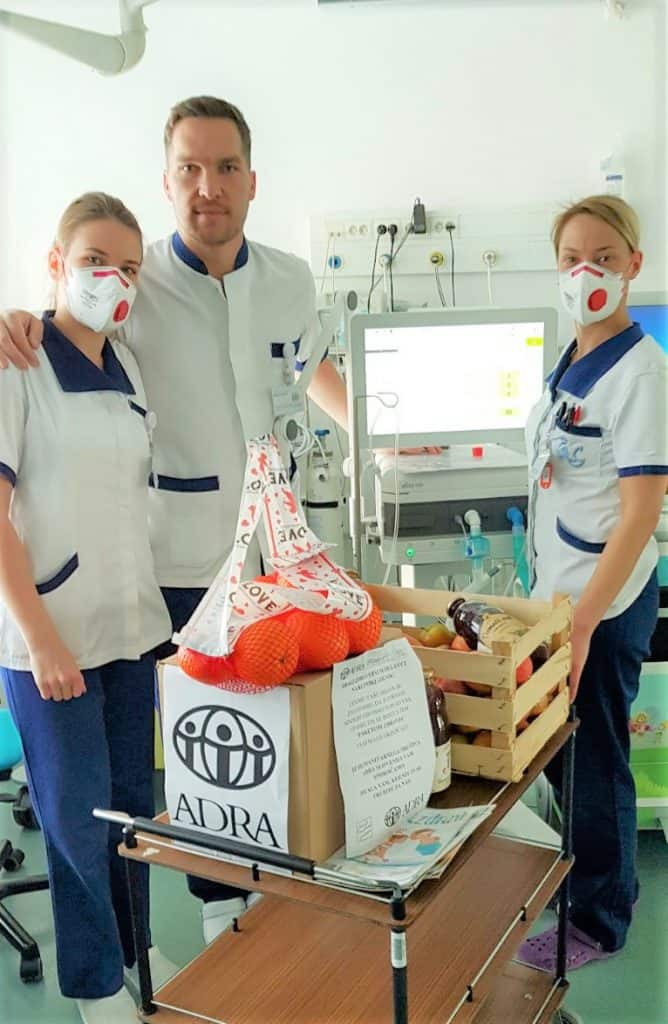Dear ADRA family,
ADRA is currently working around the world to assist those affected by the COVID-19 crisis. Slovenia is one of the countries in which we work, where ADRA is responding to the needs of the medical staff and residents in some elderly homes during the pandemic—two groups who are especially vulnerable.
“When we are on the field, the personal stories of our beneficiaries are those that motivate us and push us further, to continue, to help as much as we can,” said Katja Kotnik, the Country Director of ADRA Slovenia.
Manca is one of those whose stories inspire ADRA. She is a medical nurse and team leader in one of the elderly homes in Slovenia. This institution was among others chosen by ADRA to receive some support in a form of a ‘Health Basket’ – packages to increase the immune system of the medical staff and elderly residents. These packages contain vitamin C in various forms: locally produced apples, oranges, natural juices and vitamin C supplements.

In Slovenia, stories about overburdened medical staff, low wages and poorly handled medical sector were circulating daily long before the COVID-19, but with the spreading of the coronavirus infections the medical staff has become stressed near to exhaustion.
Even though Manca’s situation is very difficult she is still more worried about others. ”During these times I am mostly concerned about the health of our elderly residents. I don’t know how we would be able to handle an outburst of infections in our elderly home and save as many lives as possible with proper care considering the low staff capacity we have available. On the other hand, we are all worried about how to protect our families and close ones by not getting infected ourselves,” Manca said.
“Because we, the medical staff in the elderly home, are in a preventive quarantine, we are separated from our families. We work in 12 -14 hour shifts, and to prevent potential spreading of the virus, we drive to a hotel outside our municipality after our shifts. This place is reserved only for our medical staff, and each person gets a room, bathroom and we are separated between each other. We are prevented to have any physical contacts with our loved ones. This is how the administration is trying to save the lives of our elderly residents, by having stable medical teams. It is really not easy for us and we are physically and mentally burned out, often experiencing fear. I have not been this stressed in all my years in this profession.’
Manca is a young mother, and like many medical staff has children from whom she needs to be separated in these times.
“I have two children, and two step-children. At this moment I have been separated from them for over two weeks. Children mean the most to me. Now I am separated from my daughter who is only 2 years old and when I talk to her for a few minutes at 8pm before she goes to sleep, it just breaks my heart. Every day she keeps asking me: ‘When are you coming home mommy?’, and I keep promising her that it will be soon, even though I have no idea how long it will last. My older son is in the 6th grade and he has a lot of work in his primary school but because I am at work and staying apart from them, I have to rely on my parents to help him out. The school curriculum now is demanding and the activities online and on the computer are complicated for elderly people, like my parents. I really wish that our lives would go back to normal,” Manca said.
In the elderly home, the teams have additional stressful jobs. “We have a lot of preparations, restructuring of work and spaces, emptying departments and setting up isolated rooms. We need to move the residents so that we will have some room for the infected patients in isolation, if it comes to this,” she added.
All of these procedures are not only stressful for the medical staff but also for the elderly residents, who are accustomed to their peaceful arrangements and daily routines. Additionally, most are heavily dependent on the visits of the relatives due to psycho-social support. Now, this connection is cut off for many and many are in the middle of this restructuring in the elderly institutions.
These needs were analysed by ADRA during our response to COVID-19, and the decision was made to send the Healthy Baskets to healthcare workers and elderly residents to let people know this: We care about you and we appreciate all that you are doing. You have our support.
Manca wrote to us: “I am so grateful for you and the donations of the vitamin C packages. There was a lot of healthy fruit and supplements that we regularly use to strengthen our immune system during the preventive quarantine. Now we are especially mentally and physically drained out, so our immune system is even more vulnerable. Our staff was very happy that you thought of us and keep us healthy. I am most thankful that someone is thinking about us during these times so thank you a lot to ADRA!”
You can continue to support the work of ADRA in Slovenia and around the
world at www.ADRA.org